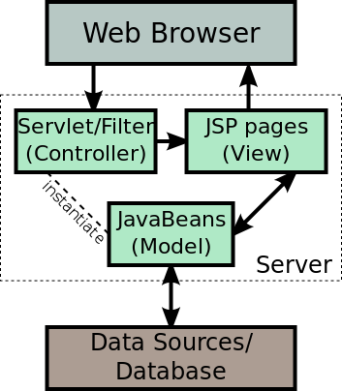JavaServer Pages (JSP) is a technology that helps software developers create dynamically generated web pages based on HTML, XML, or other document types. Released in 1999 by Sun Microsystems,JSP is similar to PHP, but it uses the Java programming language.To deploy and run JavaServer Pages, a compatible web server with a servlet container, such as Apache Tomcat or Jetty, is required.
Architecturally, JSP may be viewed as a high-level abstraction of Java servlets. JSPs are translated into servlets at runtime; each JSP’s servlet is cached and re-used until the original JSP is modified.JSP can be used independently or as the view component of a server-side model–view–controller design, normally with JavaBeans as the model and Java servlets (or a framework such as Apache Struts) as the controller. This is a type of Model 2 architecture.
JSP allows Java code and certain pre-defined actions to be interleaved with static web markup content, with the resulting page being compiled and executed on the server to deliver a document. The compiled pages, as well as any dependent Java libraries, use Java bytecode rather than a native software format. Like any other Java program, they must be executed within a Java virtual machine (JVM) that integrates with the server’s host operating system to provide an abstract platform-neutral environment.
JSPs are usually used to deliver HTML and XML documents, but through the use of OutputStream, they can deliver other types of data as well.The Web container creates JSP implicit objects like pageContext, servletContext, session, request & response.
Why Use JSP?
JavaServer Pages often serve the same purpose as programs implemented using the Common Gateway
Interface (CGI). But JSP offer several advantages in comparison with the CGI.
Performance is significantly better because JSP allows embedding Dynamic Elements in HTML Pages
itself instead of having a separate CGI files.
JSP are always compiled before it’s processed by the server unlike CGI/Perl which requires the server to
load an interpreter and the target script each time the page is requested.
JavaServer Pages are built on top of the Java Servlets API, so like Servlets, JSP also has access to all
the powerful Enterprise Java APIs, including JDBC, JNDI, EJB, JAXP etc.
JSP pages can be used in combination with servlets that handle the business logic, the model supported
by Java servlet template engines.
Finally, JSP is an integral part of J2EE, a complete platform for enterprise class applications. This means that
JSP can play a part in the simplest applications to the most complex and demanding.
